President of the Republic of Azerbaijan Ilham Aliyev attended the opening of the 29th International Caspian Oil & Gas Exhibition - Caspian Oil & Gas and the 12th Caspian International Power and Green Energy Exhibition - Caspian Power as part of the Baku Energy Week at the Baku Expo Center, Report informs referring to AzerTac.
The head of state addressed the opening ceremony.
Speech by President Ilham Aliyev
- Good morning, ladies and gentlemen.
First of all, I would like to greet all our guests. Welcome to Azerbaijan. First of all, I would like to express gratitude to the organizers. As it was already mentioned, the Caspian Oil and Gas Exhibition started 30 years ago in 1994. This event has played an instrumental role in attracting foreign direct investments into the energy sector of Azerbaijan. Since that time, this event has transformed into a bigger event and is now called Baku Energy Week, because it embraces all the major segments of energy policy – oil, gas, upstream, downstream, and of course, green energy.
30 years ago, Azerbaijan, of course, was a different country, making its first steps on the path of independence. It was a time full of difficulties, challenges, and tragic events. Unfortunately, the restoration of our independence in October 1991 was accompanied by aggression from neighboring Armenia and the occupation of almost 20 percent of our territories.
At that time, we had one of the biggest numbers of refugees per capita, one out of eight. It was a really hard time, and we faced actually a humanitarian catastrophe. So, the only way to move forward was to attract investments, but Azerbaijan was considered a very risky place; not only the First Karabakh War and the occupation, but also internal conflicts. The Civil War of 1993 actually brought the country to the verge of collapse.
We can add here economic difficulties, 1000 percent inflation, stagnation of our industry, and a lack of energy resources. We were short of electricity and natural gas. Azerbaijan, a country famous for its energy resources for decades during the times of Tsarist Russia and then the Soviet Union, was a leader in that area not only on a regional but also on a global scale. But independence was marked by a substantial energy crisis.
The year 1993 was a turning point. The election of Heydar Aliyev as a President in October 1993 opened a new page in the history of the country, and not only in its energy segment. The large-scale economic reforms, the adoption of a new democratic constitution, the abolishment of censorship, and, of course, attempts to attract investors to the most attractive sector of our economy, which was energy.
Coming back to this event, it was actually the first international presentation of the country’s potential. As it was already mentioned, just several months after the first Caspian Oil and Gas Exhibition, the “Contract of the Century” was signed on September 20, 1994, which also was a turning point in the transformation of the country. We have managed to establish a very fruitful relationship with our investors. As a result, bp has remained for thirty years and probably will remain for at least additional 30 years as our strategic partner. bp from UK and Amoco from United States led the consortium of international oil companies back in 1994 and trusted us.
Because as I said, it was a very risky place. Investors are always very sensitive to political difficulties and geopolitics, but they trusted the government and also the people. As I said, SOCAR and the consortium established a very trustful cooperation at that time.
So, that’s how it started. In just three years’ time, oil was produced from the Chirag Platform, which was a remarkable, record event in the history of oil business. From signing the contract to production, only three years, and then, two pipelines were commissioned, both towards the Black Sea ports. By 1999 both of them were operational. Then, the major oil export pipeline from Baku to Ceyhan, spanning more than 1700 kilometres in a very difficult terrain, with the strong cooperation between regional countries and companies was commissioned.
It was actually a big piece of oxygen for us, for our economy and if you look at how our economy developed, you will see its coordination with our energy policy. Then, Azerbaijan already proved itself as a reliable partner, and more investments came into different areas of our economy, and of course, in the energy sector.
Today, June 4th, will be remembered not only as the day when the Shahdeniz contract was signed 20 years ago at the oil and gas exhibition but also the day when we will soon have the groundbreaking ceremony for three solar and wind renewable power stations, which will be built by our brotherly company Masdar from UAE. This is a demonstration of how Azerbaijan and its international partners transform from fossil fuels to renewables, understanding that fossil fuels will remain important not only for us but also for our partners for many years.
So, Shahdeniz has put an end to the gas shortage in Azerbaijan. Because before that, we had been importing natural gas, now we are exporting, and our exports are growing. This year, it will most probably exceed 24 billion cubic meters. We have eight countries, which are recipients of Azerbaijani gas. Azerbaijan has proven to be a reliable partner in supplying gas to many countries. The European Commission at the regular Advisory Council of the Southern Gas Corridor, which was held several months ago, named Azerbaijan as a Pan-European gas supplier, and this is true. Six out of eight countries, which are recipients of our natural gas are European countries. Of course, the geography of our supply definitely will grow. We are now in the active phase of negotiations with several more countries, which need Azerbaijani gas in order to provide the energy security.
As we've said many times, you cannot separate national security from energy security. The countries which depend on imports, of course, look for the most reliable and long-term partners and contracts. They find exactly that here in Azerbaijan. Our word has the same value as our signature. All the contracts, which have been signed during the last 30 years, have been implemented completely. All of them pass through parliament ratification and are then signed into law. So not a single word is changed. This is the trust you build for decades. This is a result why we are now experiencing another rapid development in renewables.
What I said about the ceremony, which we will soon witness and participate in, is just the beginning. By the way, Masdar already inaugurated a 230-megawatt solar power station last October, and now one gigawatt.
Now, two more projects are in the pipeline - with one currently under construction, and another one set to start construction soon, bringing the renewable potential of Azerbaijan close to two gigawatts, only from solar and wind. If we add what we are doing with hydropower stations now in Karabakh and East Zangazur, we will see that our target to have two gigawatts of renewables by the end of 2027 is absolutely realistic. This is only the beginning.
By the way, in the liberated areas of Karabakh and East Zangezur, we have a huge hydropower potential. Since the territory was liberated in November 2020, we have already inaugurated hydropower stations with a total capacity of 270 megawatts. Within three to five years, this figure will reach 500 megawatts. So, one gigawatt of renewables will save us roughly half a billion cubic meters of natural gas, which the market needs and will need.
So, today is really a remarkable day. Twenty-eight years after signing the Shahdeniz contract at the oil and gas exhibition, we have already signed it - so it will be the groundbreaking ceremony for one gigawatt capacity. As I said, it's only the beginning, because the potential is huge. Our partners are leading companies on a global scale. Masdar is a champion in green energy and green energy transition.
It was not just a coincidence that Azerbaijan will host the COP29, a year after the UAE did it, and the legacy that UAE left to us is highly valuable. First, I'd like to congratulate my dear friend, Minister Sultan Ahmed Al Jaber, and ask him to convey my gratitude and greetings to my brother, the President of UAE, Sheikh Mohamed bin Zayed Al Nahyan, for his friendship, partnership, and valuable advices in moving on this difficult journey on COP.
It is not easy, but we are ready for that. As I’ve said many times, we are not to blame for having oil and gas. It’s something that God has given us. We must be judged not for having these resources, but for how we manage them, how we transform this wealth through the channels into the society, how we build an inclusive society, and how we manage to reduce poverty from 50% to 5% and reduce foreign debt from almost 100% to 7.7%.
So, these are all the factors by which we must be judged, if I may use that word. By taking on this very responsible duty as the host of COP, we fully realized the advantages and maybe some complications. But we are committed to it.
Climate change here in Azerbaijan can be seen when you look at the Caspian Sea shore. Every year, we see the sea is going away. That's because of climate change, because of irrational human activity. Because the Caspian Sea is supplied by the rivers, which come from beyond our borders. We have zero responsibility for this catastrophe if we don't take serious measures, we will face a major disaster. We are doing everything in order to supply more water to the sea, building new dams and water storages to collect water. But the main vessels, which feed the Caspian Sea, are not in Azerbaijan.
So, climate change is a challenge for every country. We have taken a proactive step. We are now working actively with our partners. We have established a Troika with the UAE and Brazil, the future host of COP30. As a former chair of the Non-Aligned Movement, which consists of 120 countries, we are trying to build bridges between this institution and the European Union. Azerbaijan has signed declarations on strategic partnership with 10 member states of the EU. We are actively working with the Small Island Developing States. We are planning to establish a special fund to support them.
Because for us here in Azerbaijan climate change is a problem, for them it is an existential threat. So, we are trying to demonstrate maximum responsibility and at the same time, to build bridges between different parts of international community. One of the most important results, if we achieve at COP apart from financing, will be putting down mutual accusations and stopping blaming each other for what is happening. We need to join our efforts, put down all these claims, and concentrate on the agenda, which will help us to live on this planet, not only for us but also for our children and grandchildren.
Once again, ladies and gentlemen, welcome to Azerbaijan. Today is really a historic day. June 4th, as I said, will remain in our history as the day of signing the Shahdeniz, and as the day of the groundbreaking ceremony for green transition. Of course, every time this important gathering produces new ideas, new contacts, new contracts, and this time, Baku Energy Week will also produce great results.
I wish you all the best, and using this opportunity I would like to invite you all to be our guests at COP29 this November.
Thank you for your attention.
x x x
Speakers at the event included Minister of Energy and Natural Resources of the Republic of Türkiye Alparslan Bayraktar who read out President Recep Tayyip Erdogan’s letter, Minister of Industry and Advanced Technology of the United Arab Emirates Sultan Ahmed Al Jaber, Principal Deputy Assistant Secretary at the Bureau of Energy Resources of the U.S. Department of State Harry Kamian who read out US President Joseph Biden’s letter, Director of Energy Policy at European Commission Cristina Lobillo Borrero, Secretary General of OPEC Haitham Al Ghais, Director-General of the International Renewable Energy Agency (IRENA) Francesco La Camera.
x x x
President of the Republic of Azerbaijan Ilham Aliyev and UAE Minister of Industry and Advanced Technology Sultan bin Ahmed Al Jaber laid foundation stones for Neftchala, Bilasuvar solar power plants and Absheron-Garadagh wind power plant.
A video was presented about the new stations.
x x x
Then, the head of state viewed the exhibitions.
President Ilham Aliyev signed the guest book of the exhibition.
A family photo was taken.
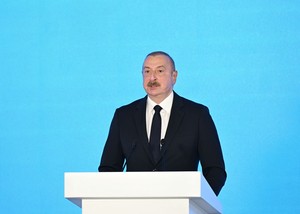

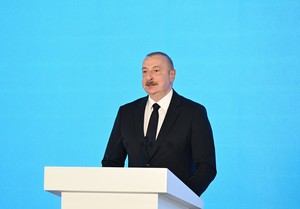
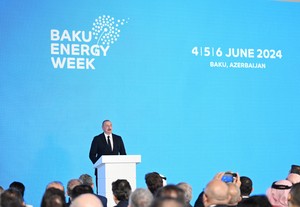
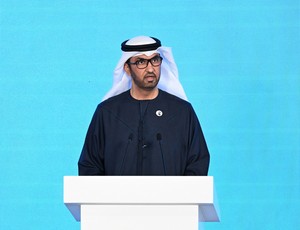
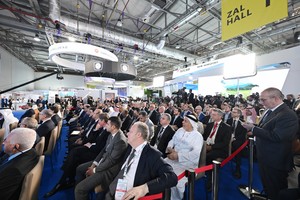
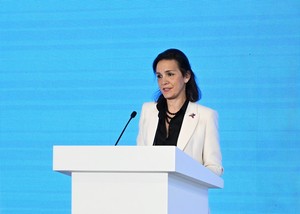
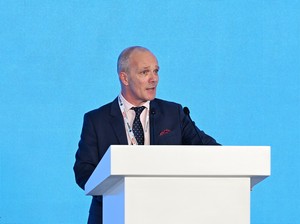
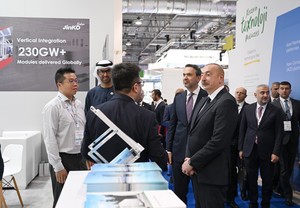
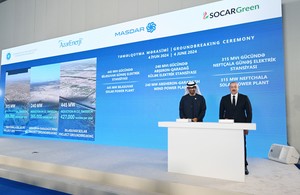
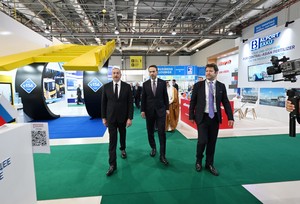

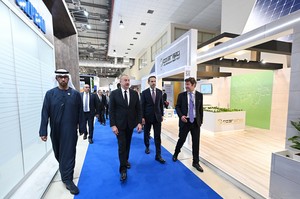
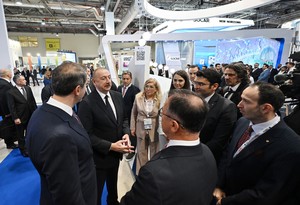

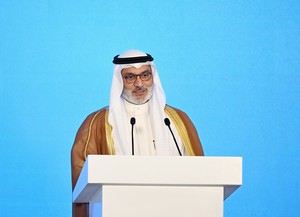
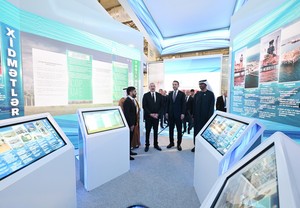
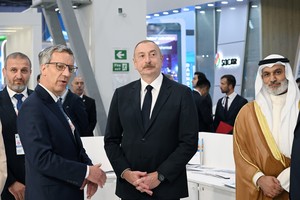
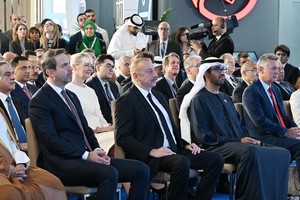
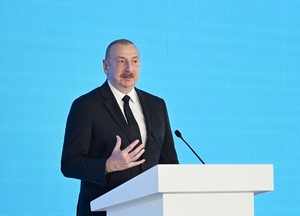
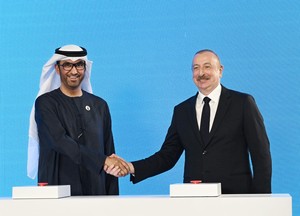
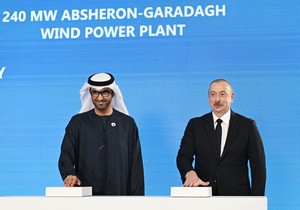
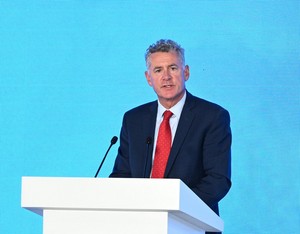
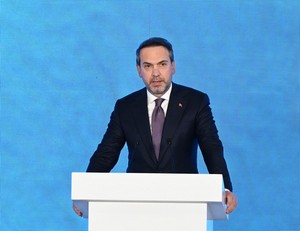
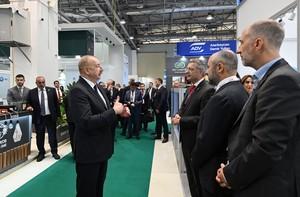
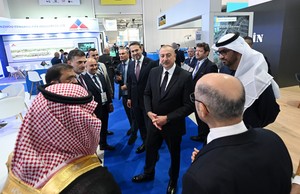
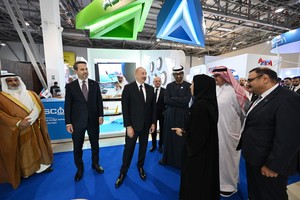
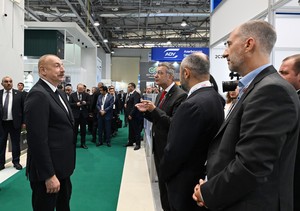
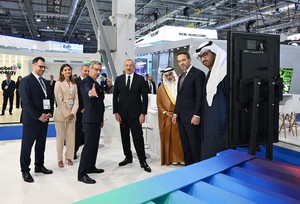

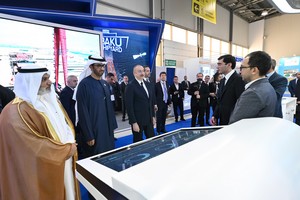
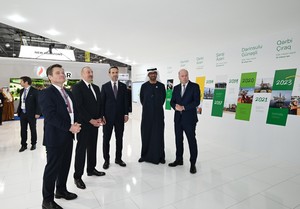
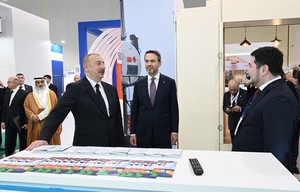
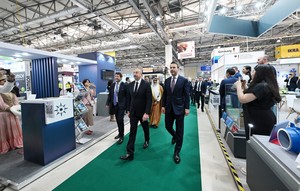
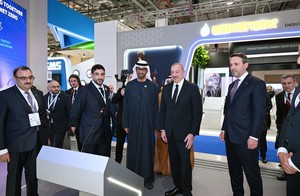
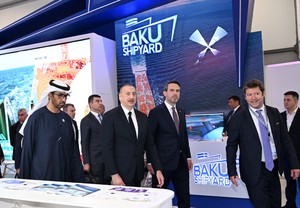


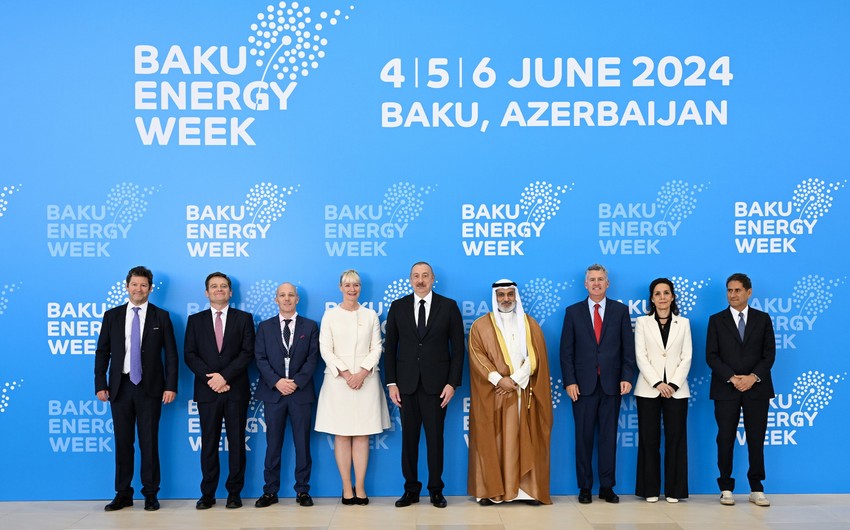 https://static.report.az/photo/02bb467f-cb89-36e1-8f83-7c79f01f8aa7.jpg
https://static.report.az/photo/02bb467f-cb89-36e1-8f83-7c79f01f8aa7.jpg

